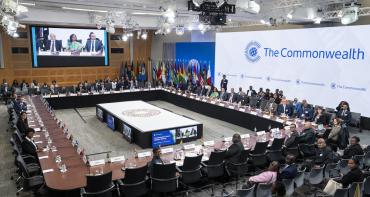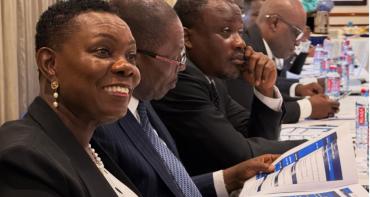Toronto, Canada 1984: Commonwealth finance ministers warned of the dangers posed by rising interest rates to highly indebted developing countries at a major summit.

Commonwealth finance ministers warned of the dangers posed by rising interest rates to highly indebted developing countries at a major summit in 1984.
As governments around the world grappled with the after effects of the early-1980s recession, finance ministers gathering in Toronto, Canada, from 19-20 September 1984, stressed the need for international financial institutions to play a “fuller role” in the debt crisis.

Accepting the findings of a major report, ‘The Debt Crisis and the World Economy’, undertaken by a Commonwealth Group of Experts, the ministers urged international institutions to commit resources and policies to promote long-term adjustment and sustained growth in debtor countries.
“Ministers were conscious of the dangers that still existed because of developing country indebtedness for the stability of the world financial system as well as for the economic, social and political fabrics of those countries,” they stated in their final communiqué.
“Despite the action so far taken by debtors, banks and by the international institutions, the international financial system remained under serious strain ... Special attention needed to be paid to the serious debt problems of many low-income countries arising in particular from debt.”
Sub-Saharan Africa and other developing regions were at the time badly affected by the recession that emerged in the USA in the early 1980s. Interest rates were again on the rise, while commodity prices were falling, raising doubts whether developing countries could service their debts.
The Commonwealth Group of Experts, led by former UK Minister Lord Lever of Manchester, was commissioned at the New Delhi Commonwealth summit in November 1983 to look at the management of developing countries’ debts.
The report concluded that the world’s financial stability was on a “knife-edge”, declared that existing financial flows were “unsustainable” and urged international institutions to recognise the gravity of the debt crisis faced by developing nations.
Commonwealth Secretary-General Shridath Ramphal, writing in the report’s foreword, accused the international community of being “wholly indifferent” to the difficulties of the poorest countries.
He said: “Patched-up arrangements – rescheduling of bank debts, new lending to help pay interest on outstanding debt, IMF [International Monetary Fund] loans on conditions of severe austerity for debtor countries – have for the moment, bought time. But the source of instability remains and some of the short-term solutions may have deepened it.
“Some [countries] have reached the stage where access to credit even for the most essential imports is being denied.”
Managing debt
Since 1985, the Commonwealth’s internationally renowned Debt Recording and Management System has been assisting countries to record and manage their external and domestic debt. Over 60 nations use the system to record, monitor and analyse their debt positions including countries and territories outside the Commonwealth, such as Afghanistan and Kosovo.



